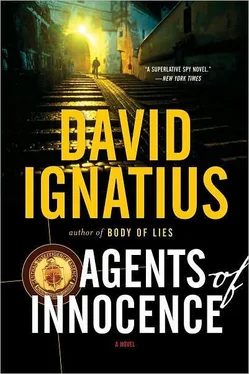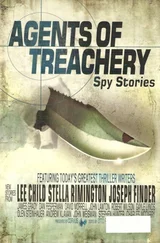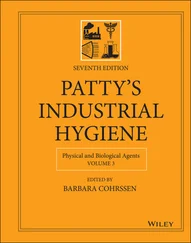David Ignatius - Agents of Innocence
Здесь есть возможность читать онлайн «David Ignatius - Agents of Innocence» весь текст электронной книги совершенно бесплатно (целиком полную версию без сокращений). В некоторых случаях можно слушать аудио, скачать через торрент в формате fb2 и присутствует краткое содержание. Жанр: Шпионский детектив, на английском языке. Описание произведения, (предисловие) а так же отзывы посетителей доступны на портале библиотеки ЛибКат.
- Название:Agents of Innocence
- Автор:
- Жанр:
- Год:неизвестен
- ISBN:нет данных
- Рейтинг книги:3 / 5. Голосов: 1
-
Избранное:Добавить в избранное
- Отзывы:
-
Ваша оценка:
- 60
- 1
- 2
- 3
- 4
- 5
Agents of Innocence: краткое содержание, описание и аннотация
Предлагаем к чтению аннотацию, описание, краткое содержание или предисловие (зависит от того, что написал сам автор книги «Agents of Innocence»). Если вы не нашли необходимую информацию о книге — напишите в комментариях, мы постараемся отыскать её.
Agents of Innocence — читать онлайн бесплатно полную книгу (весь текст) целиком
Ниже представлен текст книги, разбитый по страницам. Система сохранения места последней прочитанной страницы, позволяет с удобством читать онлайн бесплатно книгу «Agents of Innocence», без необходимости каждый раз заново искать на чём Вы остановились. Поставьте закладку, и сможете в любой момент перейти на страницу, на которой закончили чтение.
Интервал:
Закладка:
Agents of Innocence
David Ignatius
PART I
Prologue
Beirut; April 1983
Fuad heard the bomb twice. What stayed in his mind long afterward was the reverberation of the explosion, sounding in real life a fraction of a second after he heard it on the telephone. In that moment, which contained at once the past and the future, Fuad thought of Rogers and said a prayer.
Fuad was at a restaurant called Au Vieux Quartier in East Beirut, calling his hotel in West Beirut to check for a message, when he heard it through the earpiece. The roar of an explosion-loud even for Beirut-travelling through the telephone wires at near the speed of light. A millisecond later, in the time it took the sound waves to travel from West to East, he heard the roar in his other ear.
“A bomb!” shouted the frightened desk clerk into the phone.
“Can you see where the smoke is coming from?” asked Fuad. There was a pause as the clerk ran into the street to check.
“From the Corniche,” said the clerk breathlessly when he returned. “Near the American Embassy.”
“What color is the smoke?”
“White,” said the clerk.
“Ya’Allah!” said Fuad with a cry of supplication. My God!
White smoke meant a very large explosion. A bomb that detonated so powerfully and quickly that it sucked the oxygen out of the air, leaving a white plume of smoke.
Fuad’s first impulse was to bolt the restaurant and find Rogers, dead or alive. But discipline took over. He had a meeting at one-thirty with a courier who was bringing an important piece of intelligence. For a brief moment, he imagined what Rogers would say when they met that night at the Ararat Restaurant and Fuad told him that, even on this chaotic day, he had managed to obtain the document that Rogers had requested.
Fuad took a seat at the bar, waiting for his contact to arrive. Everyone was talking about the explosion. Did you hear it? It was very loud! The bartender remarked that the bomb must have been in West Beirut and everyone nodded and relaxed slightly. West Beirut was on the other side. It was in another universe. Fuad said nothing. He ordered a glass of mineral water and sipped it quietly.
The bartender and his friends continued their conversation. Fuad listened unobtrusively. He seemed almost to blend into the surroundings. Though he was a Sunni Moslem, he looked like any of the rich Christian businessmen sitting at the bar. Like them, he wore a silk suit and lit his cigarettes with a gold lighter. The Arabs have a word for this sort of camouflage. They call it taqiyya. It means that deception and concealment are permissible, when they are necessary. If a Moslem finds himself in the midst of a group of Christians, he should say that he is a Christian. What does it matter? The truth is elastic.
A Lebanese man stuck his head in the door and shouted to the bartender: “L’Ambassade Americaine!” The buzz of conversation about the bomb grew louder. The American Embassy had been hit! Fuad felt his stomach tighten. He tried to think of something else, but every thought led back to the embassy and Rogers. He tried saying the names of Allah silently to calm himself. The compassionate. The merciful…
“The Marines will know what to do!” said the bartender knowingly. Several customers agreed.
No, they won’t, thought Fuad. That was the problem. There were 2,000 Marines at the airport and no one could explain why. When Fuad had asked a member of the CIA station six months ago what the Marines were going to accomplish in Lebanon, the young CIA officer had explained that it was “a presence mission.” “A presence mission,” Fuad had repeated thoughtfully, nodding his head, not wanting to offend the young CIA man. “Of course.” Perhaps Rogers would know what to do.
Fuad chain-smoked cigarettes and stared out the window. At precisely one-thirty, his contact, a dignified little man named Mr. Khoury, arrived to find Fuad lying in wait outside the restaurant. Fuad steered the man into a back alley, took the document from him and bid a hasty goodbye. Then he raced toward West Beirut and the wreckage of the embassy.
Bombs bring out the crowds in Beirut, and Fuad found throngs of people still surging along the Corniche toward the embassy when he arrived at 2:30 P.M. The area had been cordoned off and he had to show his American passport to a Lebanese Army checkpoint to get close enough to see the building.
What he saw brought tears to his eyes. It was as if the flesh of the building had been ripped away, revealing the frail skeleton beneath. Many of the survivors were still standing in small groups in front of the building, too dazed to move. As Fuad listened to their conversations, he pieced together a picture of what had happened.
The people inside the embassy had never heard the sound of the explosion. Their first sensation was a sudden flash of light, then a terrific force blowing in the windows and hurling them, still in their chairs, against the walls of their offices. It was like being in a centrifuge, the survivors said. Dust and shards of glass seemed to fly through the air in slow motion.
When things stopped moving, the first thought most people had was that the embassy had been hit by a mortar round. Several people, who had been through such attacks before, stayed on the floor awaiting another round. Others, their bodies pumping with adrenalin, pushed through the debris like Supermen in a half-mad effort to lock their office safes.
The lobby of the embassy was now a vision of Hell: a blackened wreck, dense with smoke and dust. Outside there was chaos as ambulances, fire trucks, Lebanese Army troops, and Marines from the airport converged on the bombed-out embassy. The Marines had established a defense perimeter around the building. The young soldiers, tense and hollow-eyed, fingered the triggers of their automatic weapons as they scanned the gathering crowd of Lebanese onlookers.
Behind them in the ruins of the embassy, rescue workers were picking pieces of bodies out of the rubble.
Fuad considered asking one of the embassy officials standing numbly in front of the building about Rogers, but decided against it. It would be a gross breach of security. And he wasn’t sure he wanted to know the truth yet. So he loitered instead in the shadows. He felt a chill, so cold that he trembled for a moment there by the sea.
Fuad checked his hotel for messages, thinking that perhaps Rogers had left a coded signal, but there was nothing.
A last wisp of hope led him to the hotel where Rogers had been staying, an anonymous, out-of-the-way place off Hamra Street. He peppered the desk clerk with questions. Was Mr. Rogers in his room? Had he left any messages? Had he checked out? Had anyone been in his room?
The clerk refused to answer any questions until Fuad slipped 100 Lebanese pounds into his coat pocket.
Rogers had not come back, the clerk said. But an hour ago three men had arrived from the embassy in a great hurry. They entered Rogers’s room, packed up all his belongings, and took them to a car waiting outside.
They paid the bill and said that Mr. Rogers had checked out.
PART II
Beirut; Fall 1969
1
Beirut; September 1969
Tom Rogers stepped off the Middle East Airlines plane into a vision of Oz. The new office towers and apartment blocks of West Beirut sparkled in the afternoon sun; the diminutive porters at the airport bustled to and fro, shouting and strutting as they hurled the baggage from place to place; in the distance, their horns blaring to wake the dead, a line of cars and trucks stood bumper-to-bumper along the airport road, bound for the enchanted city.
Rogers carried his two-year-old daughter Amy gently in his arms. She had gotten sick in Oman and was still weak. Rogers blamed the incompetence of the Omani doctor. But in Beirut, Rogers was convinced, Amy would get well. Behind Rogers, holding their eight-year-old son Mark by the hand, came his wife Jane. She was radiant, with jet-black hair and a creamy complexion, looking stylish even in the simple gray skirt and red blouse she had worn on the long flight.
Читать дальшеИнтервал:
Закладка:
Похожие книги на «Agents of Innocence»
Представляем Вашему вниманию похожие книги на «Agents of Innocence» списком для выбора. Мы отобрали схожую по названию и смыслу литературу в надежде предоставить читателям больше вариантов отыскать новые, интересные, ещё непрочитанные произведения.
Обсуждение, отзывы о книге «Agents of Innocence» и просто собственные мнения читателей. Оставьте ваши комментарии, напишите, что Вы думаете о произведении, его смысле или главных героях. Укажите что конкретно понравилось, а что нет, и почему Вы так считаете.












